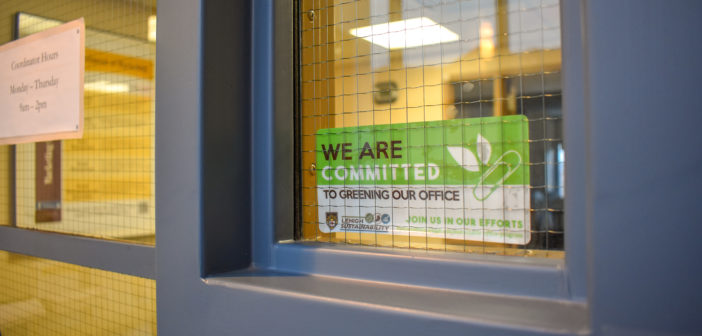Last semester, the Eco-Reps began the new Sustainable Living Program, which actively encourages residential halls and Greek organizations to implement small changes into their daily lives that can have a positive impact for the planet.
Students involved with the program become leaders in their residential halls, raising awareness about the environmental impact of their actions.
Program assistant director Christopher Miller, ’21, became involved with the Eco-Reps last semester and is excited about the program’s future as it expands throughout the school.
“The Sustainable Living Program’s focus is to get students and residents to reflect on their behaviors and see how they can act more sustainably in their everyday lives,” he said. “Sometimes, it is the little things that make a big difference.”
Sustainability program manager Katharine Targett hopes that by 2020, Lehigh will take the lead among universities in sustainable practices.
She said Lehigh set waste diversion goals that it expects to achieve by 2020, which include minimizing waste generated on campus and increasing recyclables, both by 10 percent from the 2010 baseline, and diverting all food waste from the trash stream.
“I really want Lehigh to think holistically and see sustainable practices become normal,” Targett said.
While the Eco-Reps program itself plays a major role in the campus’ sustainability practices, the Sustainable Living Program creates incentive for more students to take on leadership roles on campus to ensure each student is minimizing their negative impact on the environment.
“The program encourages people to be introspective on how they live and how they can live a little differently,” Miller said.
Nicole McCallum, ’18, founded the program with the goal of involving as many students as possible in raising awareness about environmentally sustainable practices across campus.
“There are a lot of people on campus who want to be sustainable but may not know how,” McCallum said. “I wanted to help show students (how to) become sustainable stewards themselves and see how easy it can be to decrease your ecological footprint.”
Miller said some of the best ways to become more environmentally conscious is through small changes that can easily go unnoticed. The program encourages these lifestyle adjustments by conducting room checks, where representatives suggest possible changes that could decrease the ecological footprint of the room.
He said each student has the ability to make a significant impact on the campus’ mission to become more sustainable.
“(We want to) make kids aware of the influence that they have,” Targett said. “Students think, ‘Oh, I’m just one person. I’m just a drop in the bucket.’ We want them to get certified and see how everything adds up to empower them.”
Targett said one of the biggest issues regarding sustainability at Lehigh is food waste from dining halls.
“When you’re at Rathbone, you can always go up for seconds,” she said. “Think before you eat. Get it to go if you can’t finish the leftovers. It makes a big difference.”
As 2020 approaches, the incentive to become a more environmentally friendly campus is growing, and the Sustainable Living Program advocates for prioritizing sustainability and understanding the importance of everyday actions.
McCallum said students should get involved in preserving the planet, which has a finite amount of resources. She said it is important that students avoid wasting the resources they currently have.
While the Sustainability Office hopes to meet its waste diversion goals by 2020, the Sustainable Living Program wants to continue to improve the impact the campus has on the environment, in both the near and far future. One of the most important factors in achieving this goal is campus-wide involvement, which Targett said has increased in the past two years.
“I really think that what I’ve seen is students, faculty and staff approach our office and want to actively do their part in sustainability on campus,” she said. “I really think that’s the best thing we can do. You want to see the other people get involved. You want to encourage and motivate others to make a difference, too.”






Comment policy
Comments posted to The Brown and White website are reviewed by a moderator before being approved. Incendiary speech or harassing language, including comments targeted at individuals, may be deemed unacceptable and not published. Spam and other soliciting will also be declined.
The Brown and White also reserves the right to not publish entirely anonymous comments.